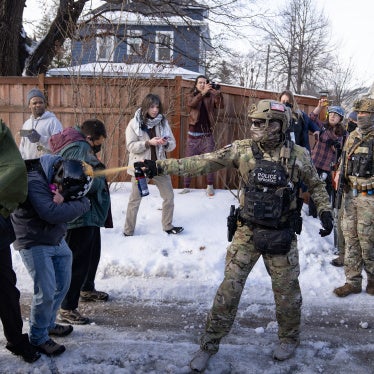As the U.S. armed forces begin to transfer captured Taliban and al-Qaida members to the naval base at Guantanamo Bay in Cuba, American officials are sending the public two messages about conditions there. The first message is that the camp will be no tropical resort. As a senior officer noted, "comfortable" will not be a word used to describe the detainees' accommodations.
The other message is that the detainees will be treated humanely. This is the more important message, as international law requires, at a minimum, humane treatment for all persons captured during armed conflicts. The U.S. government may, however, not fully understand what international law requires. News reports have indicated that Taliban and al-Qaida detainees will be confined in small cages covered with metal roofs with chain-link sides and concrete floors. The cages will offer scant shelter from wind, rain and cold. Details about sanitary and hygiene facilities at the camp have not been publicly released.
This is not the first time detainees have been held at Guantanamo Bay. In 1994, the U.S. government responded to refugees fleeing from Haiti and then Cuba by creating a temporary holding facility at the base. While conditions there were stark and hardly hospitable, the detainees were held in permanent hard-walled shelters.
The United States is a party to the Geneva Conventions, the laws governing the treatment of persons captured during armed conflict. Every captured fighter is entitled to humane treatment, understood at a minimum to include basic shelter, clothing, food and medical attention. In addition, no detainee - even if suspected of war crimes such as the murder of civilians - may be subjected to torture, corporal punishment, or humiliating or degrading treatment. If they are tried for crimes, the trials must satisfy certain basic fair trial guarantees.
Prisoners of war are entitled to further protections, commensurate with respect for their military status as soldiers. Indeed, the Geneva Conventions provide that prisoners of war must be quartered in conditions that meet the same general standards as the quarters available to the captor's forces, e.g. the U.S. armed forces.
Not all of the detainees shipped to Cuba are considered POWs. Under the Geneva Conventions, captured fighters are POWs if they are members of an adversary state's armed forces or are part of an identifiable militia group that abides by the laws of war.
Most members of al-Qaida, wearing no insignia or abiding by the laws of war, would probably not qualify as prisoners of war. But Taliban soldiers, whether Afghan or foreign, comprised the armed forces of Afghanistan and should be entitled to POW status. If there is doubt about anyone's status as a prisoner of war, the Geneva Conventions require that he be treated as such until a competent tribunal determines otherwise. To our knowledge, no tribunals have made any such determinations.
Which brings us back to the cages in Cuba. The United States would never house members of its armed forces in chain-link cages, nor would it accept such treatment for any of its soldiers captured by enemy forces. Such conditions are simply unacceptable for anyone, much less people entitled to be treated as POWs.
It may be difficult for Americans who have lived through the horror of Sept. 11 and its aftermath to accept the idea that anyone captured during the fighting in Afghanistan has basic rights that must be respected. But to think otherwise is to accept the values of terrorism. Those who were willing to send airplanes into office buildings deny the fundamental dignity and human rights possessed by every human being -even one's enemy.
In fighting terrorism, the United States must show that it operates with a different set of values, the values affirmed by international human rights and humanitarian law.








